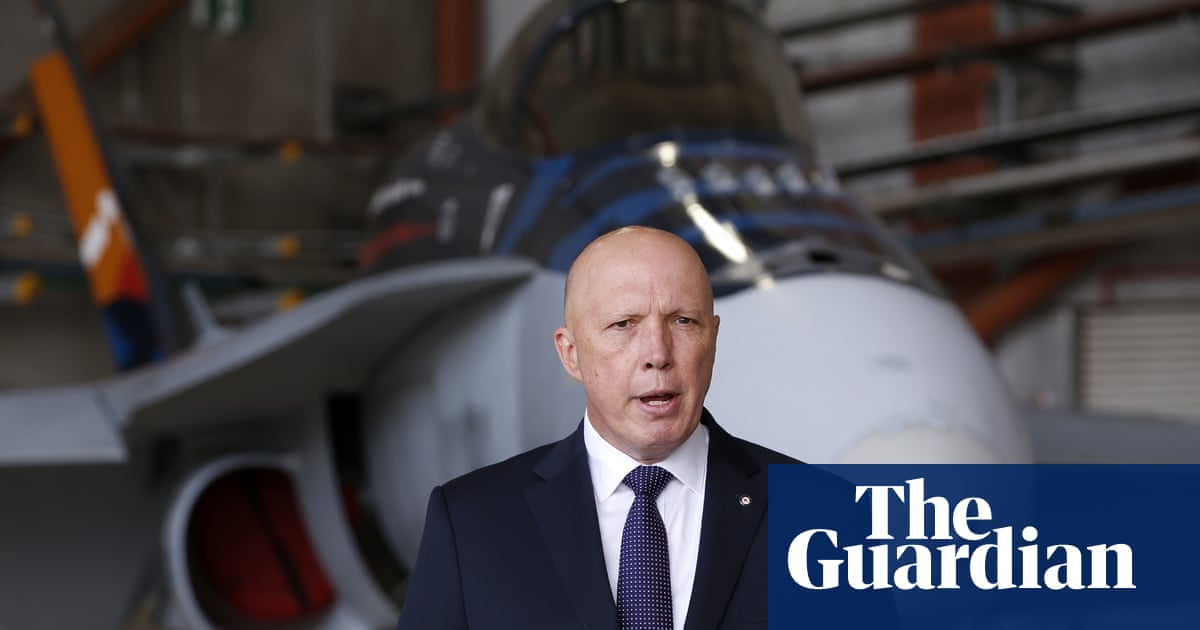Space must not become “a new realm for conflict”, Peter Dutton will say as he launches the Australian defence force’s new space command.
The defence minister will on Tuesday accuse some countries – including Russia – of seeing “space as a territory for their taking”. Dutton will tell a conference in Canberra that Australia will work with allies to push for “a safe, stable and secure space domain”.
In a second speech on Tuesday, Dutton will say Australia is “in the crosshairs” for cyber-attacks, while declaring that authorities believe China has the capability to mount “an unprecedented digital onslaught”.
Both speeches reflect the Coalition’s determination to promote a tough message on national security before the election due in May – despite both parties having a largely similar approach to the major strategic challenges.
Dutton will on Tuesday “officially announce” that Australia’s Defence space command has now been established, bringing together personnel from the air force, the navy and the army – as the government foreshadowed last year.
In an advance copy of the speech, he says the command – headed by air vice-marshal Cath Roberts – “will initially be modest compared to those similar, well-established functions which already exist among some of our allies”.
Addressing an air force-organised conference, Dutton will raise the possibility of Australia establishing a US-style space force in future.
“It’s a necessary endeavour with a view to protecting our national interests and our need for a space force in the future,” Dutton will say, according to speech extracts distributed by his office to the media.
Dutton is expected to say that space “is becoming more congested and is already contested – particularly as the boundaries between competition and conflict become increasingly blurred through grey-zone activities”.
He will note more than 7,500 satellites orbit the Earth and thousands are being launched each year.
“We know that some countries are developing capabilities to threaten or degrade space networks, to target satellites, and to destroy space systems – countries that see space as a territory for their taking, rather than one to be shared,” he will say.
Dutton will cite an anti-satellite missile test in November last year when Russia “destroyed its own redundant Cosmos 1408, which left behind a cloud of more than 1,500 pieces of lethal debris that will take decades to clear”.
At the time, the head of Nasa described the test as “unconscionable” and a threat to the safety of seven astronauts – including two Russians – onboard the International Space Station.
The Russian military defended the test, insisting it was aimed at boosting the country’s defensive capabilities and denying the fragments were dangerous.
Dutton will tell Tuesday’s conference that Australia will “invest in new military space capabilities to counter threats, to assure our continued access to space-based intelligence, surveillance and reconnaissance, and to uphold the free use of space”.
“The Australian Department of Defence and the US National Reconnaissance Office have committed to a broad range of cooperative satellite activities which will expand Australia’s space knowledge and capabilities,” he will say.
The NRO is a key US intelligence agency that gathers information through satellites and has a presence in the sometimes-controversial Pine Gap facility in the Northern Territory.
Australia and India are also set to develop their space ties, after the prime minister, Scott Morrison, met with his Indian counterpart, Narendra Modi, on Monday night.
The government announced a $25m plan to deepen the Australian Space Agency’s cooperation with India.
The two countries will also establish an exchange program for young officers in the two countries’ defence forces and will expand research on critical minerals – but a long-awaited trade deal is yet to be completed.
Morrison and Modi discussed the conflict in Ukraine. India has called for an end to hostilities but so far declined to explicitly condemn Russia, with which it has longstanding ties.
At the outset of the virtual summit, Morrison said the “tragic loss of life underlines the importance, of course, of holding Russia to account” and also showed the need to improve cooperation between like-minded democracies.
Dutton will tell Tuesday’s event the RAAF has now delivered Australian military assistance for Ukraine on three separate Globemaster flights and will describe Russia’s president, Vladimir Putin, as “a despot hellbent on reinstating Russia’s imperial reach”.
Dutton has previously faced accusations of politicising national security, including through his prediction last November that Australia would probably join with the US to defend the democratically governed island of Taiwan in a future conflict with China.
At the time, Labor’s Senate leader, Penny Wong, said “amping up the prospect of war” was “the most dangerous election tactic in Australian history – a tactic employed by irresponsible politicians who are desperate to hang on to power at any cost”.
But Dutton will say on Tuesday that Australians “expect their governments to speak frankly about the challenges which confront our nation” rather than “ring-fence them from difficult issues or insult their intelligence”.
Opening a new facility for the Australian Signals Directorate in Canberra, Dutton will say cyberwarfare “is unbound and unchecked, without clear and well-known cues of escalation”.
Dutton will say Beijing’s expansion of its hard power “has been matched by the growth of its cyber forces, to a point where our authorities assess that China is now capable of mounting an unprecedented digital onslaught”.
“Spying is at one end of a spectrum of cyber activities. At the other end are cyber-attacks of such scale and sophistication they can be nationally, regionally, and globally debilitating. Australia has fortunately not experienced such an attack. But make no mistake, we are in the crosshairs.”
Last July, the Morrison government joined with the US, the UK and other countries to accuse China of malicious cyber activities, prompting the Chinese embassy in Australia to denounce the claims as “groundless” and “extremely hypocritical”.
Labor has said Australia needs to boost its cyber defences, noting recent reports from the Australian National Audit Office about weaknesses in preparedness within government agencies.
